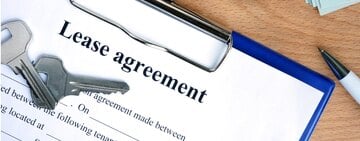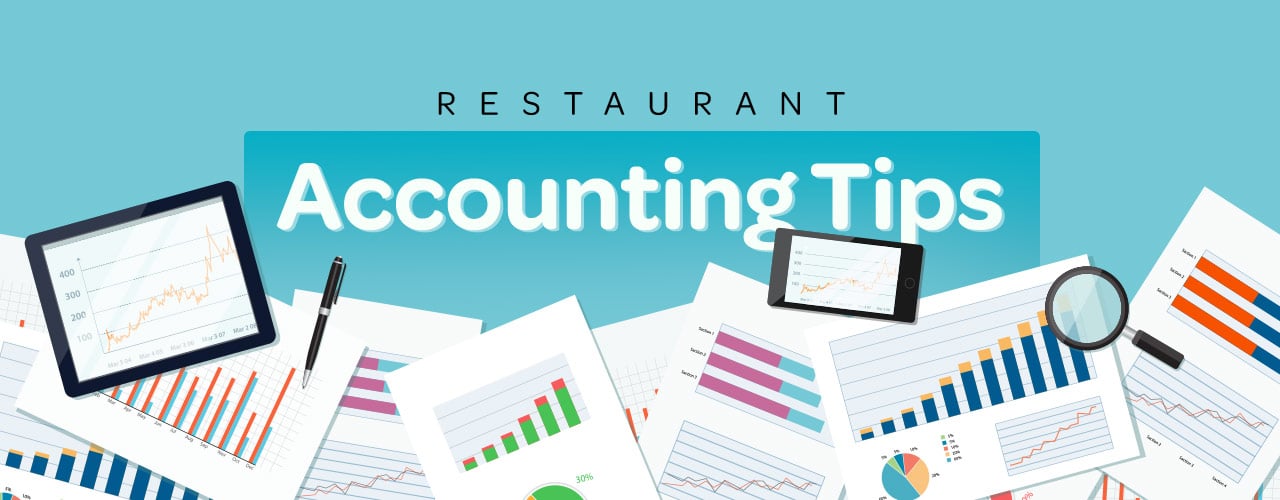
Restaurant Accounting Tips
Last updated on 4/11/2022While running a restaurant may begin with a talent for cooking and a passion for hospitality, you can only gain and maintain a profit in your business through proper bookkeeping. With the proper understanding of restaurant accounting, you can help your new establishment become a success and remain profitable through the years.
Shop All Financial and Bookkeeping FormsWhat Is Restaurant Accounting?
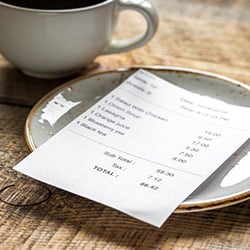
Restaurant accounting or restaurant bookkeeping involves monitoring your restaurant's finances and adjusting the budget accordingly to ensure that your business starts off on the right foot and remains profitable. A business strategy, organization, and the willpower to keep accurate accounting records are essential factors in determining whether or not your restaurant will get off the ground. Restaurant bookkeeping is one of the most important aspects of running a restaurant.
Here are the key responsibilities involved in restaurant bookkeeping:
- Knowing where you’re spending your money
- Keeping track of how much you’re spending
- Understanding where your revenue is coming from
- Figuring out how much money you need to earn to make a profit
- Reconciling bank statements
- Filing restaurant taxes
- Preparing financial statements, budgets, and accounts payable records
Restaurant Bookkeeping Tips
Practicing thorough restaurant accounting is crucial, but it can be overwhelming to think of managing your own books and records at first. To better understand restaurant bookkeeping, read these restaurant account tips and suggestions, and get on the way to being as successful as you imagined.
1. Ask Other Peers and Colleagues
One of the first places to start when handling your restaurant’s accounting is to ask other chefs how they handle their own accounting records. Knowing how a colleague or other industry professionals approach restaurant bookkeeping may provide insight as to how you should address your own books and records.
Getting the recommendations of other successful restaurateurs can help you determine if you’re prepared to handle accounting issues on your own, or whether you should consider hiring an outside firm.
2. Be Accurate with Your Bookkeeping
The only way to know if you're in the red or the black is to keep an accurate account of all money coming and going from your restaurant. This may sound like common sense, but many financial anxieties come from a lack of dedication to accurate bookkeeping.
You must record precise amounts of money for every expense and all revenue. Rounding up or down by a few cents or dollars can add up over the course of a week or month and begin to affect your bottom line.
3. Understand and Track Your Expenses
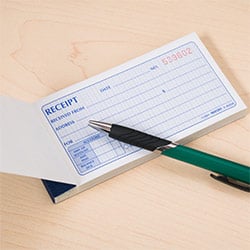
There are two categories you can lump almost any expense into: prime costs and fixed costs. Prime cost refers to the majority of your restaurant’s expenses including ingredients, beverages, staffing, taxes, and benefits. You should keep a close eye on your prime costs to track any reoccurring accounting issues and find areas to cut costs and raise profits.
Fixed costs are the costs that either don’t change or you have no control over the change. This includes your rent or mortgage, equipment costs, insurances, permits, and other operational expenses. These fixed costs typically make up the minority of your restaurant expenses.
Keeping records of how much you’re spending on prime costs and fixed costs is a necessary step in sales forecasting and determining how much money you need to earn each week to break even or earn a profit.
4. Keep Track of Revenue
Keeping track of your revenue is equally important to restaurant bookkeeping as knowing your expenses. Have accounting records on hand to show how much you earn from food sales, merchandise sales, or catering jobs.
Underestimating your weekly income could make it look like your business is losing money when it’s not. Alternatively, overestimating your income could cause overspending because you weren’t working with an accurate budget. The best way to avoid either issue is to regularly record exact amounts of revenue.
5. Create a Profit and Loss Statement
A restaurant profit and loss statement, or P&L, keeps all restaurant accounting information organized in one concise document. You may customize a P&L to suit your business’s specific needs.
This statement is an effective tool for keeping track of your revenue, food costs, labor costs, and operating expenses. If this is the method with which you choose to organize your books and records, it's advisable that you provide a detailed breakdown of all your costs and revenue for ease of understanding.
Though it's best to be detailed and use them on a weekly basis, you can generate monthly or yearly P&L's to your liking and include as much or as little detail as you think is necessary.
6. Use Restaurant Accounting Software
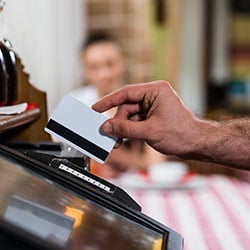
Restaurant accounting software includes financial software and point of sale (POS) systems. These programs are designed to help you organize your inventory counts and transactions quickly and accurately.
Do some research before picking an accounting software for your restaurant. Depending on the software, you can do other things such as manage payroll, sales reports, and methods of payment.
7. Consider Outsourcing Payroll
If you do decide to manage your restaurant’s finances, still consider outsourcing payroll. That’s because there are liability issues and high penalty fees on the line for mistakes made in payroll.
Hire an experienced person or company to handle the complicated and ever-changing local, state, and federal laws surrounding workforce requirements. As a business owner, you won’t have time to keep up with these changes.
What Does a Restaurant Accountant Do?
A restaurant bookkeeper oversees the finances and budgets for a restaurant. Restaurant accountants or bookkeepers can often offer advice on reducing overhead costs and reducing food costs in your establishment. Restaurant bookkeepers are in charge of the following:
- Tracking your expenses and deposits
- Generating a profit and loss statement
- Maintaining records for tax obligations
- Overseeing payroll and vendor invoices
Should I Hire a Restaurant Accountant?
Restaurant bookkeeping can quickly become too complex for restaurant owners to handle. If you are not confident in your ability or lack the time that’s needed for accurate and thorough bookkeeping, consider hiring an accountant.
There are many independent accountants and accounting firms that specialize in services for restaurants including:
- Bookkeeping
- Financial consultations
- Business projections
- Payroll management
Restaurant Accounting Software
Restaurant accounting software can help you to manage your books and records yourself. Going with the right software may even help you save money in the long run.
Utilize Financial Software
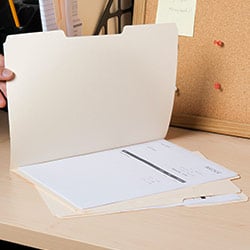
Financial software is designed to make restaurant bookkeeping simpler and more efficient for you as the business owner.
When selecting the right accounting software for your restaurant, take the following qualities into consideration:
- Available online via smartphone or computer
- Easy to use for someone with little to no experience
- Due to high turnover rates in the industry, make sure it’s easy to add and remove staff members on payroll
- Connects to your POS system
The following programs are some of the more popular software systems on the market today:
- Microsoft Dynamics GP - Gives you control over finances, inventory, and business information in a tool that incorporates your email and calendar with your data, reports, and business management software.
- Quickbooks - Offers a Startup Financial Planner Tool that allows you to enter your expected revenue and shows you what your startup costs might be. Then, you can download a full report of your cost information.
- Wagepoint - Helps you automate the process of issuing pay checks and comply with the required withholding and employer tax amounts.
- Sage 50 - Helps you manage bills, inventory, banking, payroll, and taxes as well as process credit card payments.
Choose a Point of Sale System
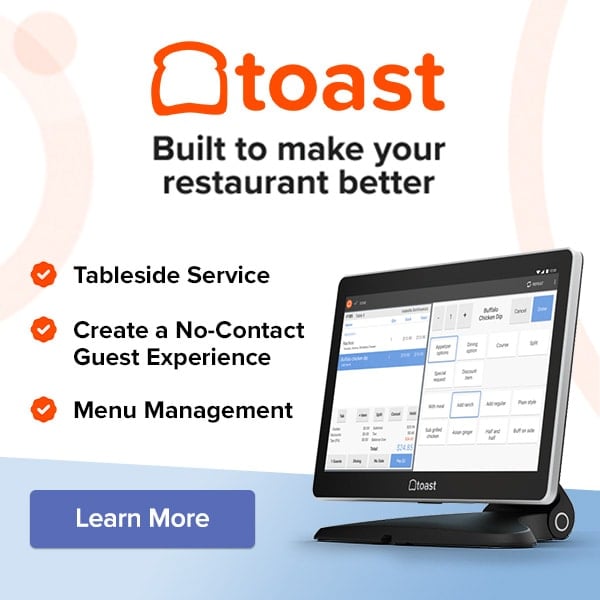 Point of sale (POS) systems are computer systems used to record orders and complete payment transactions. When it comes to managing your books and records, some POS systems allow you to track inventory counts, labor costs, and methods of payment as well as run sales reports.
Point of sale (POS) systems are computer systems used to record orders and complete payment transactions. When it comes to managing your books and records, some POS systems allow you to track inventory counts, labor costs, and methods of payment as well as run sales reports.
Toast POS is a leading point of sale system with a suite of features that allow you to set up tableside order and pay options, manage your online menu, and create a no-contact guest experience.
In order for a restaurant to be profitable, it needs more than a solid concept and talented chef. Staying on top of your spending costs, inventory, and revenue is key to turning a profit. With these restaurant accounting tips, you can begin to organize your accounting records and have a better understanding of your financial picture. In the end, organization and accuracy are the keys to effective restaurant bookkeeping.


